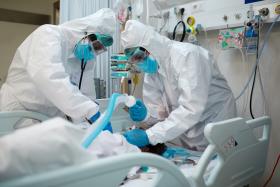
UPMC Hamot 2023 Critical Care & Emergency Medicine Conference
Join your colleagues and gain the latest updates in critical care and emergency medicine!
This activity has been designed to increase the participant’s critical thinking and knowledge of some common and not-so-common challenges in critical care and emergency medicine. Specific topics were selected based on challenges faced almost daily in critical care and emergency patient care, as well as ongoing and emerging health care concerns and trends. Ample time for questions and answers has been built in to each presentation. Audience members will also have the opportunity to speak one-on-one with presenters during refreshment breaks and lunch.
Target Audience
Critical care and emergency medicine physicians, nurses, advanced practice providers, and pre-hospital personnel, as well as primary care practitioners with an interest in critical care and emergency medicine will benefit from attendance at this activity.
Learning Objectives
At the conclusion of this activity, the participants should be able to:
- Identify situations in which pharmacotherapy is appropriate.
- Explore various agents for chemical intervention.
- Investigate effective routes of administration.
- Recognize delirium and understand there are many potential causes and mimics.
- Identify the ICU work-up for delirium.
- Recognize delirium mitigation strategies in the ICU.
- Identify basics of the ECMO circuit.
- Recognize criteria for ECMO selection and candidacy.
- Discuss the difference in indications and management of Veno-Venous and Veno-Arterial ECMO.
- Recognize ECMO common complications and management.
- Describe anticoagulation management in ECMO patients.
- Discuss creating a diagnostic approach to right ventricular failure.
- Recognize unique pathophysiology involved in right ventricular failure.
- Discuss common pitfalls in management & diagnosis of right ventricular failure.
- Discuss the utility and limitations of point of care echocardiography.
- Describe how to obtain the 5 main views of point of care echocardiography.
- Identify LV hypokinesis, volume responsiveness, RV failure, and tamponade with echocardiography.
- Compare and contrast management styles in the emergency room vs ICU.
- Discuss what is required to be a critical care EMS provider or part of a flight team.
- Describe what processes occur behind the scenes of a critical care transport mission, before, during and after.
- Discuss the diagnostic approach and management of hyponatremia.
- Define situations and pathologies that can lead to abdominal compartment syndrome.
- Identify the key points for diagnosis of abdominal compartment syndrome.
- Discuss the general management options and sequelae for abdominal compartment syndrome.
Additional Information
| Attachment | Size |
|---|---|
| 458.66 KB |
8 - 8:05 | Introduction | |
8:05 – 8:35 | Safety First Part 1: Management of the Acutely Agitated Patient in the Emergency Department | Kristin Juhasz, DO, FACEP |
8:35 – 9:05 | Safety First Part 2: Management of the Acutely Agitated Patient in the Intensive Care Unit | Logan Pyle, DO |
9:05 – 9:50 | Extracorporeal Membrane Oxygenation: The Basics, the Blunder and the Beauty | Carlos Racedo Africano, MD |
9:50 – 10:05 | Break/Exhibit Hall | |
10:05 – 10:35 | Failure of the Forgotten Ventricle: The Right & Wrongs | Osvaldo Martinez, DO |
10:35 – 11:05 | Pediatric Status Asthmaticus | Timothy Kaselitz, MD, MPH |
11:05 – 11:50 | Point of Care Echocardiography | Timothy Baptist, MD |
11:50 – 12:30 | Break/Exhibit Hall | |
12:30 – 1:30 | “How I Manage” Panel Discussion | Sarah Johnson, RN; Kristin Juhasz, DO; Carlos Racedo Africano, MD; William VanDuzer, PA-C; Kelsey Wegelin, RN; Katie Watson, DNP, CRNP |
1:30 – 2:15 | What to Expect When You're Expecting a Helicopter | Francis X. Guyette MD, MPH, FACEP, FAEMS, Michael L. Shaffer, MSN, RN, CFRN, PHRN, NREMT-P,CMT-E |
2:15 – 2:30 | Break/Exhibit Hall | |
2:30 – 3 | The Do’s and Don'ts of Hyponatremia | Emmanuelle Cordero Torres, MD |
3 – 3:30 | Vascular Postoperative Complications | Francis D. Ferdinand, MD, FACS, FACC |
3:30 - 4 | Abdominal Compartment Syndrome | Melissa Loveranes, DO, FACOS, FACS |
4 | Adjournment | |
TWO WAYS TO ATTEND THIS HYBRID CONFERENCE:
OPTION 1:
In Person at the Ambassador Banquet & Conference Center..
Registration fees includes the seminar, continental breakfast, refreshment breaks and lunch.
OPTION 2:
Virtually via Zoom
Registrants will be e-mailed a Zoom link 3 days prior to the conference. Virtual attendees will be able to ask questions using the Q&A function in Zoom.
ATTIRE
Attire for the conference is business casual. Since meeting room temperatures can vary, it is recommended that you bring a light jacket or sweater with you to the conference.
SPECIAL NEEDS
Participation by all individuals is encouraged. Advance notification of any special needs (i.e. gluten free or vegan meal, private room for nursing mothers, handicap accessibility) will help us provide better service. Please notify us of your needs at least two weeks in advance of the program by e-mailing the Hamot CME office at [email protected] or calling 814-877-5691.
COURSE DIRECTORS:
Kristin Juhasz, DO, FACEP
Clinical Assistant Professor of Emergency Medicine
UPMC Hamot

Carlos J. Racedo Africano, MD
Associate Director of Critical Care
Director of Critical Care Education, Outreach and Research
UPMC Hamot

Catherine Watson, DNP, CRNP
Adult-Gerontology Acute Care Nurse Practitioner
Critical Care Medicine/Intensivist Department
University of Pittsburgh Medical Center, Hamot
FACULTY:
Timothy Baptist, MD
Intensivist
Department of Critical Care
UPMC Hamot
Emmanuelle Cordero Torres, MD
President Nephrocare LLC
Francis D Ferdinand, MD, FACS, FACC
Professor of Cardiothoracic Surgery
University of Pittsburgh School of Medicine
Director of Cardiac Surgery
UPMC Hamot Heart & Vascular Institute
Francis X. Guyette MD, MS, MPH, FACEP, FAEMS
Medical Director, STAT MedEvac
Professor of Emergency Medicine
University of Pittsburgh
Sarah Johnson, BSN, RN
Department of Medical Intensive Care Unit
UPMC Hamot
Kristin A. Juhasz, DO, FACEP
Clinical Assistant Professor of Emergency Medicine
UPMC Hamot
Timothy Kaselitz, MD, MPH
Assistant Professor of Adult and Pediatric Critical Care Medicine
Director, Point-of-Care Ultrasound Education, Pediatric Critical Care Medicine Fellowship Program
Melissa Ann H. Loveranes, DO, FACOS, FACS
Trauma, Acute Care Surgery, Surgical Critical Care
Great Lakes Surgical Specialists
UPMC Hamot
Osvaldo Martinez, DO
Intensivist & Emergency Medicine Physician
Department of Critical Care
AdventHealth Tampa
Logan Pyle, DO
Director Neurocritical Care
UPMC Hamot
Carlos J Racedo Africano, MD
Associate Director of Critical Care
Director of Critical Care Education, Outreach and Research
UPMC Hamot
Michael L. Shaffer, MSN, RN, CFRN, PHRN, NREMT-P,CMT-E
Regional Manager
STAT MedEvac
Kelsey Wegelin, RN
Department of Emergency Medicine
UPMC Hamot
William VanDuzer, PA-C
Department of Emergency Medicine
UPMC Kane
Catherine Watson, DNP, CRNP
Adult-Gerontology Acute Care Nurse Practitioner
Critical Care Medicine/ Intensivist Department
University of Pittsburgh Medical Center, Hamot
No relationships with industry relevant to the content of this educational activity have been disclosed.
Authors disclosure of relevant financial relationships with any entity producing, marketing, re-selling, or distributing health care goods or services, used on, or consumed by, patients is listed above. No other planners, members of the planning committee, content reviewers and/or anyone else in a position to control the content of this education activity have relevant financial relationships to disclose.
ACCREDITATION
In support of improving patient care, the University of Pittsburgh is jointly accredited by the Accreditation Council for Continuing Medical Education (ACCME), the Accreditation Council for Pharmacy Education (ACPE), and the American Nurses Credentialing Center (ANCC), to provide continuing education for the healthcare team.
Physician (CME)
The University of Pittsburgh designates this live activity for a maximum of 6.75 AMA PRA Category 1 Credits™. Physicians should claim only the credit commensurate with the extent of their participation in the activity.
Nursing (CNE)
A maximum of 6.75 nursing contact hours will be awarded. Participants will be able to claim credit commensurate with the extent of their participation in the program.
PHYSICIAN ASSISTANT (AAPA)
The University of Pittsburgh has been authorized by the American Academy of PAs (AAPA) to award AAPA Category 1 CME credit for activities planned in accordance with AAPA CME Criteria. This activity is designated for 6.75 AAPA Category 1 CME credits. PAs should only claim credit commensurate with the extent of their participation.
Trauma Credit Hours
Select sessions meet the requirements for trauma education hours. The maximum trauma education credit available for this conference is 1.5 hours.
Prehospital Continuing Education Credits
Continuing education credits for prehospital emergency medicine services personnel has been approved for 7.0 credit hours.
Other Healthcare Professionals
Other health care professionals will receive a certificate of attendance confirming the number of contact hours commensurate with the extent of participation in this activity.
Available Credit
- 6.75 AAPA Category I CME
- 6.75 AMA PRA Category 1 Credit™The University of Pittsburgh School of Medicine is accredited by the Accreditation Council for Continuing Medical Education to provide continuing medical education for physicians.
- 6.75 ANCCUPMC Provider Unit is accredited as a provider of continuing nursing education by the American Nurses Credentialing Center’s Commission on Accreditation
- 6.75 Attendance
If you are interested in exhibiting at this conference, please reach out to Haylee Esposito at [email protected].
Price
UPMC EMPLOYEE PAYMENT VIA JOURNAL ENTRY TRANSFER OR MEB SCHOLARSHIP FUNDS
If you are a UPMC employee and your department will be responsible for payment, we can charge your department directly.
DO NOT SUBMIT a disbursement to UPMC Accounts Payable.
For journal transfer and MEB funds, please fill out the appropriate form below:
![]() MEB Tracking Form reviewed 7-6-2020.pdf
MEB Tracking Form reviewed 7-6-2020.pdf
Cancellation policy
Please notify UPMC Hamot’s CME Department of substitutions and cancellations, via email to [email protected] or by telephone at 814-877-5691.
IF YOU ARE REQUIRED TO PAY BY CHECK
Please contact the UPMC Hamot CME Department at: 814-877-5691 or e-mail: [email protected].

 Facebook
Facebook X
X LinkedIn
LinkedIn Forward
Forward
